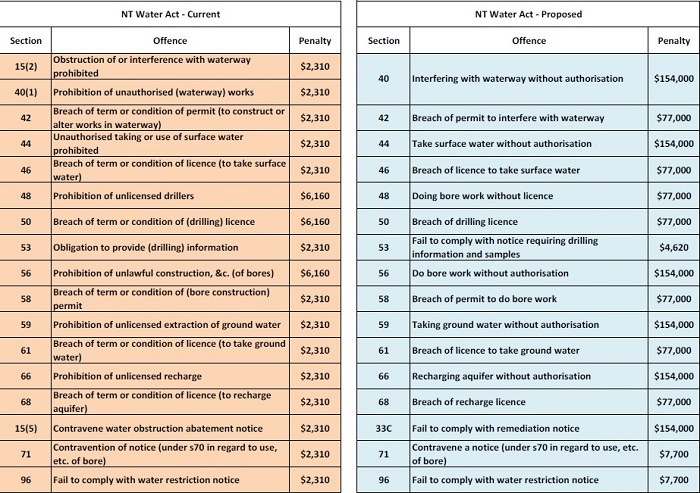
NT to pump up Water Act fines ahead of fracking
The Northern Territory Government is getting ready to change its Water Act in what has been described as its most significant amendments since 1992.
At the heart of the change is to make sure mining and petroleum companies are no longer exempt from water-use regulation.
With the NT’s moratorium on fracking now lifted and gas companies expected to start the controversial practice next year, the NT’s Department of Environment and Natural Resources is working on a series of reforms to update the Territory’s laws around water.
NT Water Controller Jo Townsend said mining companies are required to obtain a water extraction licence in all states and territories in Australia, except the Northern Territory — an oversight that needed to be addressed.
“Water allocation and use by mining and petroleum activities is [currently] not subject to the same assessment regime as other water users,” she said.
“Requiring water use by mining and petroleum activities to be regulated through the Water Act is the key matter this bill seeks to address and is an election commitment.”
Speaking to the Government’s Economic Policy Scrutiny Committee on the Water Legislation Amendment Bill 2018, Ms Townsend said further regulations around water use and fracking would soon be introduced, with another bill being drafted titled the Water Amendment [Hydraulic Fracturing] Bill 2018.
Penalties to increase by over 3,000 per cent
One of the key changes being considered by the NT Government is increasing the penalties for breaching the Water Act, making fines “comparable” with other jurisdictions in Australia.
Currently the Northern Territory sits last in terms of the severity of penalties, with the average maximum penalty rate sitting at $2,989.
By comparison, New South Wales penalties set a maximum average at $216,611.
A proposal to increase the NT average by over 3,000 per cent to $92,689 would put the Territory into third place behind Queensland and NSW.
The department’s Christine Long said the proposed increase had already faced some opposition for not going far enough, but it felt it was an appropriate rise.
“New South Wales and Queensland have had a number of issues with mining activities and as a result of that there’s been quite a number of criminal proceedings in those two states,” she said.
“So their reviews of their penalties have been in that context. We’re not in that situation at this stage, and we hope we never will be, so we feel it wouldn’t have been appropriate to go right to the top.
“We think where we’re proposing to place the NT [at third] is appropriate at the present time.
The NT’s Water Legislation Amendment Bill 2018 is expected to be voted on in parliament by the end of the year.
Gas industry ‘very comfortable’ with changes
The Australian Petroleum Production and Exploration Association’s (APPEA) Matt Doman said the gas industry was very comfortable with the Water Act changes proposed by the NT Government.
“We expect water-use to be monitored and regulated,” he told ABC Rural.
“For some time it’s been pointed out that the mining, oil and gas industries have been exempt from the [Northern Territory’s] Water Act.
Mr Doman said he did not think the Water Act changes would impact the economics of projects going forward.
He said the industry had calculated that a “large-scale onshore gas industry” in the NT would use up to 8 gigalitres of water each year, “which is not a significant water-use compared to other industries”.
While comfortable with the proposed changes to the Water Act, Mr Doman said the industry was concerned about the suggestion of further regulation.
“We don’t think, given the relatively small water-use that our industry involves compared to others, that we should be singled out for specific treatment,” he said.
“Some of the recommendations in the Pepper Report [into fracking] head in that direction.”
